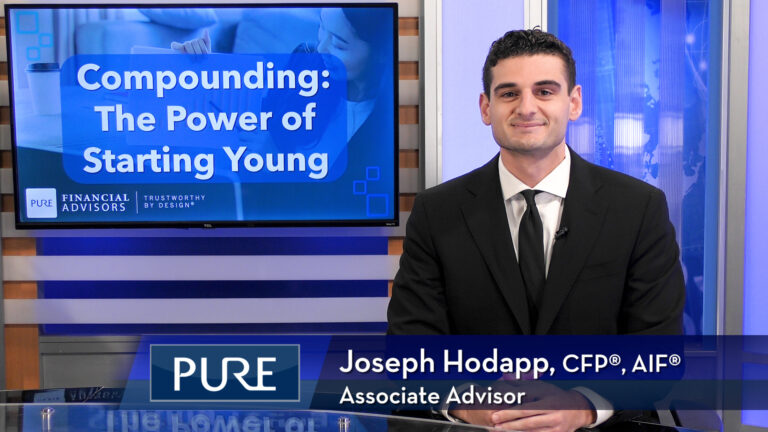Deciding who will inherit your estate is a big decision and an important part of life planning. Smart estate planning helps protect families with young children as well as helping your heirs from overpaying on taxes. Pure’s Financial Planner, Dean Heimbach, CFP®, AIF®, covers four key steps to get you started on your estate plan:
- Take an inventory of assets
- Account for your family’s needs
- Establish directives
- Review beneficiaries
FREE GUIDE | Estate Plan Organizer
Transcript
Estate Planning involves setting up a plan that establishes who will eventually receive your assets. It also makes known how you want your affairs to be handled in the event you are unable to handle them on your own for any reason. Here are 4 key steps to get you started on your estate plan.
Take an Inventory of Assets
Document what you own and its value. Tangible assets like: real estate, vehicles, collectibles. And the intangibles: Bank accounts, stocks, life insurance and IRA’s.
Account for Family’s Needs
Ensure you have enough life insurance to cover your families’ expenses. If you have underage children, name a guardian for them and document your wishes for their care.
Establish Directives
These can be carried out with a will or a trust, create an advance health care directive spells out your wishes for medical care if you become unable to make those decisions yourself. And a durable financial power of attorney that allows someone else to manage your financial affairs if you’re medically unable to do so.
Review Beneficiaries
Your will and other documents may spell out your wishes, they may not be all-inclusive. Check your retirement and insurance accounts. Retirement plans and insurance products usually have beneficiary designations that you need to keep track of and update as needed. Those beneficiary designations can outweigh what’s in a will.
Consider Professional Help
If your estate is small and your wishes are simple, an online or packaged will-writing program may be sufficient for your needs. These programs typically account for IRS and state-specified requirements and walk you through writing a will. If you have doubts about the process, it might be worthwhile to consult an estate attorney and possibly a tax advisor. Or contact Pure Financial Advisors for a free assessment and see if you’re on the proper estate planning path.
Subscribe to our YouTube channel.
IMPORTANT DISCLOSURES:
• Investment Advisory and Financial Planning Services are offered through Pure Financial Advisors, LLC, a Registered Investment Advisor.
• Pure Financial Advisors LLC does not offer tax or legal advice. Consult with your tax advisor or attorney regarding specific situations.
• Opinions expressed are subject to change without notice and are not intended as investment advice or to predict future performance.
• Investing involves risk including the potential loss of principal. No investment strategy can guarantee a profit or protect against loss in periods of declining values.
• All information is believed to be from reliable sources; however, we make no representation as to its completeness or accuracy.
• Intended for educational purposes only and are not intended as individualized advice or a guarantee that you will achieve a desired result. Before implementing any strategies discussed you should consult your tax and financial advisors.
CFP® – The CERTIFIED FINANCIAL PLANNER™ certification is by the Certified Financial Planner Board of Standards, Inc. To attain the right to use the CFP® designation, an individual must satisfactorily fulfill education, experience and ethics requirements as well as pass a comprehensive exam. Thirty hours of continuing education is required every two years to maintain the designation.
AIF® – Accredited Investment Fiduciary designation is administered by the Center for Fiduciary Studies fi360. To receive the AIF Designation, an individual must meet prerequisite criteria, complete a training program, and pass a comprehensive examination. Six hours of continuing education is required annually to maintain the designation.












